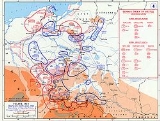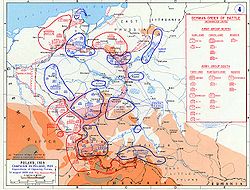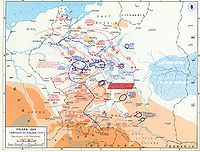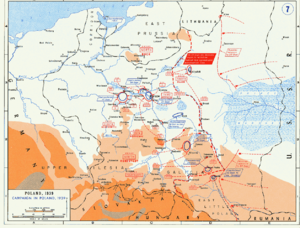
Independent Operational Group Narew
Encyclopedia



Narew
The Narew River , in western Belarus and north-eastern Poland, is a left tributary of the Vistula river...
(Samodzielna Grupa Operacyjna Narew, SGO Narew) was one of the Polish
Poland
Poland , officially the Republic of Poland , is a country in Central Europe bordered by Germany to the west; the Czech Republic and Slovakia to the south; Ukraine, Belarus and Lithuania to the east; and the Baltic Sea and Kaliningrad Oblast, a Russian exclave, to the north...
Army Corps (Operational Group
Operational Group
Operational Group was the highest level of tactical division of the Polish Army before and during World War II and the Invasion of Poland. It was corps-sized, although various Operational Groups varied in size....
s) that defended Poland during the Invasion of Poland
Invasion of Poland (1939)
The Invasion of Poland, also known as the September Campaign or 1939 Defensive War in Poland and the Poland Campaign in Germany, was an invasion of Poland by Germany, the Soviet Union, and a small Slovak contingent that marked the start of World War II in Europe...
in 1939. It was created on 23 March 1939 and was commanded by general Czesław Młot-Fijałkowski.
Tasks
SGO Narew was to defend the north-eastern frontline near the Lithuanian border, and prevent the German forces from crossing NarewNarew
The Narew River , in western Belarus and north-eastern Poland, is a left tributary of the Vistula river...
and Biebrza
Biebrza
Biebrza is a river in north-eastern Poland, a tributary of the Narew river , with a length of 155 kilometres and the basin area of 7,057 km2...
rivers. It was to secure the left flank of Modlin Army
Modlin Army
Modlin Army was one of the Polish armies that took part in the Polish Defensive War of 1939. After heavy casualties in the battle of Mława , the Army was forced to abandon its positions near Warsaw around September 10; eventually it took part in the battle of Tomaszów Mazowiecki and surrendered...
.
Operational history
The SGO Narew was defeated in the battle of Zambrów on 6 September , with the 18th Infantry Division being mostly destroyed. The remaining units retreated to Puszcza Białowieska large forest complex, and were later incorporated into Independent Operational Group PolesieIndependent Operational Group Polesie
Independent Operational Group Polesie was one of the Polish Army Corps that defended Poland during the Invasion of Poland in 1939. It was created on 11 September 1939 and was commanded by general Franciszek Kleeberg...
.
Organization
The commander of the unit was general Czesław Młot-Fijałkowski. His chief of staff was colonel Stanisław Podkowiński.It consisted of 2 infantry divisions and 2 cavalry brigades:
- 18th Infantry Division
- 33rd Infantry Division ( - reserve)
- Podlaska Cavalry BrigadePodlaska Cavalry BrigadeThe Podlaska Cavalry Brigade was a military unit of the Polish Army, created on April 1, 1937. Its headquarters were located in Białystok, it was based on the Cavalry Brigade "Białystok", existing between February 1929, and March 30, 1937.- History :In February 1929, the Polish Army created the...
- Suwalska Cavalry BrigadeSuwalska Cavalry BrigadeSuwalska Cavalry Brigade was a cavalry unit of the Polish Army in the interbellum period. It was created on April 1, 1937 out of the 4th Independent Cavalry Brigade...
Air Units attached to SGO Narew:
- Polish 151st Fighter EscadrillePolish 151st Fighter EscadrilleThe 151st Fighter Escadrille of the Polish Air Force was one of the fighter units of the Polish Army in 1939.-History:In September 1939 the 121st Fighter Escadrille was attached to the Operational Group Narew....
- Reconnaissance Squadron 51
- Polish 13th Observation EscadrillePolish 13th Observation EscadrilleThe 13th Observation Escadrille was a unit of the Polish Air Force at the beginning of the second world war. The unit was attached to the SGO Narew....
- Liaison Platoon No. 9

